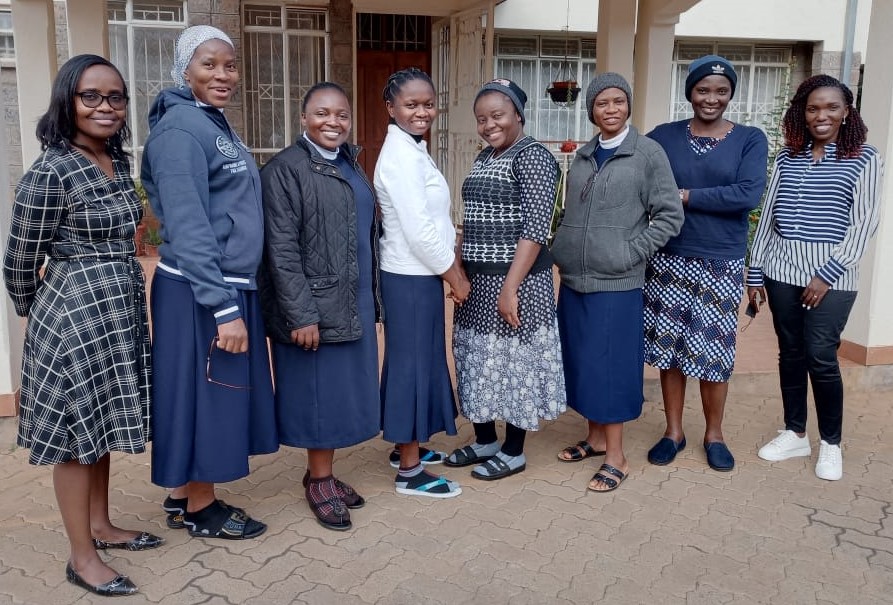By Matt Moran
It is inspiring to see collaboration and exchanges amongst religious missionaries from various congregations as they go about their social and peace-building work amongst the poor or marginalised in east and west Africa. The Missionary Sisters of the Holy Rosary are an Irish congregation founded by Bishop Joseph Shanahan in 1924 and now working in 12 countries. The Shalom Center for Conflict Resolution and Reconciliation (Shalom – SCCRR) was founded in 2009 in Kenya by Fr Patrick Devine, an Irish member of the Society of African Missions (SMA). He now serves as International Chairman of the organisation, whilst another Irish member of SMA, Fr Oliver Noonan, serves as Executive Director.

The Missionary Sisters of the Holy Rosary requested Shalom-SCCRR to help with training for their members in conflict resolution and reconciliation. Sr Theresa Nwosu, the local Superior for the Students’ House Community in Nairobi observes: “As a Catholic religious missionary congregation of religious women who face violent conflicts in our day-to-day missionary work, we have seen the need for expertise while working with the communities to address the conflict challenges that they face. An expansive understanding of the key underlying causes of these conflicts, conflict dynamics in general, and especially acquiring a range of practical skills that are essential in the management of conflict and the handling post-conflict situations becomes quite imperative.”
Shalom – SCCRR responded positively to the request. The sisters who were trained are from West Africa and have been working in Nigeria, Cameroon, and Liberia whose citizens have been victims of marginalisation, extreme poverty, and armed inter-communal, inter-religious, and political conflicts. They received training in paradigms of conflict analysis, conflict transformation, reconciliation, the role of women in conflict, and victims and perpetrators. Some of the conflict issues that emerged from the interactive sessions were dysfunctional governance systems, marginalisation, long-standing inter-ethnic and inter-religious animosities, among other structural issues.
Sr Chibuzo Ifionu noted that “understanding the causes of conflicts, I now realize that empowerment of the communities through education is key to peaceful co-existence among them.” Sr Sosylvie Cho underpinning this noted that ”we now have a deeper understanding of the kind of interventions that we should be mobilising the communities to implement. We understand that for any form of transformation to be achieved there should be a coherent and cohesive attending the personal, relational, structural and cultural issues.”
Sr Onyinyechi Nduagalugwa stated that “the Shalom-SCCRR conflict transformation and peace-building approach and methodology provides essential skills and techniques for conflict analysis and interventions based on participatory frameworks.” Sr Nodebechi Omar further noted that “Shalom’s work in ending the cycle of violence in the tribal lands of Africa is a great initiative and with the support of relevant stakeholders this will definitely be actualised.”
Sr Antonia Omah from Nigeria, currently on a mission in Cameroon remarked: “Shalom-SCCRR trainings have helped me develop new insights on the role of power, environment, and structures in conflict and its resolution. It has also deepened my understanding of the role of justice, peace, mercy, and truth in reconciliation. I now feel more prepared for my mission.”
Sr Franka Dzeaye commented: “Today’s highly competitive and conflictual environment needs competent servants who have an understanding of the theories of conflict analysis. Shalom’s methodology and conflict transformation approach has equipped me with the essential skills required to make a positive contribution in my country, Cameroon, and other African nations where I will be serving.”
The good news is that Shalom will continue to assist and empower inter-ethnic and inter-religious groups and institutions to amplify more expertise in conflict transformation and peace-building methodologies. It will create and support networks of women in peace-building across different religions and cultures. It will further strengthen peacebuilding efforts and development initiatives that augment the potential of women in their own and that of their families and communities progress towards an inter-dependent future. Its plans to launch an Empowerment Center addressing violence against women and children in the informal urban settlements (slums) in Nairobi are well advanced.
(Matt Moran is an author and writer on faith and social issues based in Cork, Ireland. His forthcoming book is The Cultural Colonisation of Africa by the West: Abortion Funding and Coercive Diplomacy).

